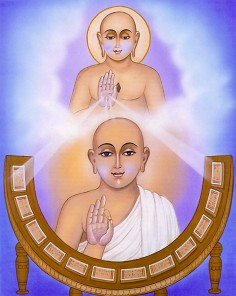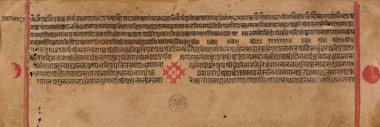Twenty-Seventh Lecture: The Bad Bullocks
There was a Sthavira and Gaṇadhara,[1] the learned sage Garga. This leader of the Gaṇa once made the following reflections: (1)
"He who rides in a car, crosses a wilderness; he who rides, as it were, in (the car of) religious exercise, crosses the Saṃsāra. (2)
"But he who puts bad bullocks[2] before his car, will be tired out with beating them; he will feel vexation, and his goad will be broken (at last). (3)
"(A bad bullock) will bite its mate in the tail; it will wound the other;[3] it will break the pin of the yoke,[4] or it will leave the road. (4)
"It will fall down on its side, or sit down, or lie down; it will jump up or caper, or it will obstinately make for a young cow. (5)
"It will furiously advance with its head lowered for an attack, or angrily go backward; it will stand still as if dead, or run at full speed. (6)
"The cursed beast[5] will rend asunder the rope, or in its unruliness break the yoke; and roaring it will break loose and run off. (7)
"Just as bad bullocks are when put before a car, so are bad pupils when yoked, as it were, to the car of the Law; they break down through want of zeal. (8)
"Some attach great importance[6] to their success; some to their good fare; some to their comfort; some nurse their anger. (9)
"Some are averse to begging; some are afraid of insults and are stuck up; (how can) I convince them by reasons and arguments[7] (?) (10)
"(A bad pupil) makes objections, and points out (imagined) difficulties; he frequently acts in opposition to the words of the superiors. (11)
"(He will say if sent to a lady): "She does not know me, she will give me nothing; I suppose she will be gone out; send some other monk there." (12)
"If sent on an errand, they do not do what they were bidden,[8] but stroll about wherever they like; or deporting themselves like servants of the king,[9] they knit their brows (when speaking to other people). (13)
"After they have been instructed, admitted into the order, and nourished with food and drink, they disperse in all directions like geese whose wings have grown." (14)
Now this driver (viz. Garga), who had to deal with bad bullocks, thought: "What have I to do with bad pupils? I am disheartened. (15)
"As are bad pupils, so are bad bullocks; I shall leave these lazy donkeys, and shall practise severe austerities." (16)
That noble man, who was full of kindness, grave, and always meditating, wandered about on the earth, leading a virtuous life. (17)
Thus I say.
Gaṇa seems to correspond to the modern Gaccha; see part i, p. 288, note 2. Gaṇadhara, therefore, does not denote here, as usual, a disciple of Tīrthakara.
Khaluṃka = galivṛṣabha. Gali is explained in the dictionaries: a strong but lazy bull. In verse 16 we meet with galigaddaha = galigardabha, as synonymous with khaluṃka.
The commentator understands the first line of this verse as having reference to the angry driver. But though an angry driver will perhaps, for all I know, put his bullock's tail to his teeth, still it is harder to supply another subject in the first line than in the second, and in the following verses.
Chimāla = jāra, see Hēmachandra, Dēśī Kōṣa 3, 27. It is a coarse term, which I replace by another, though probably the language of our coach-drivers might supply us with a more idiomatic rendering.
The metre of this verse seems to have originally been āryā, but an attempt has been made to change it into Anuṣṭubh. We meet here with the interesting form aṇusāsammī (read aṇusasammi) = anuśāsmi.
 Ganadhar Sudharma Swami
Ganadhar Sudharma Swami
